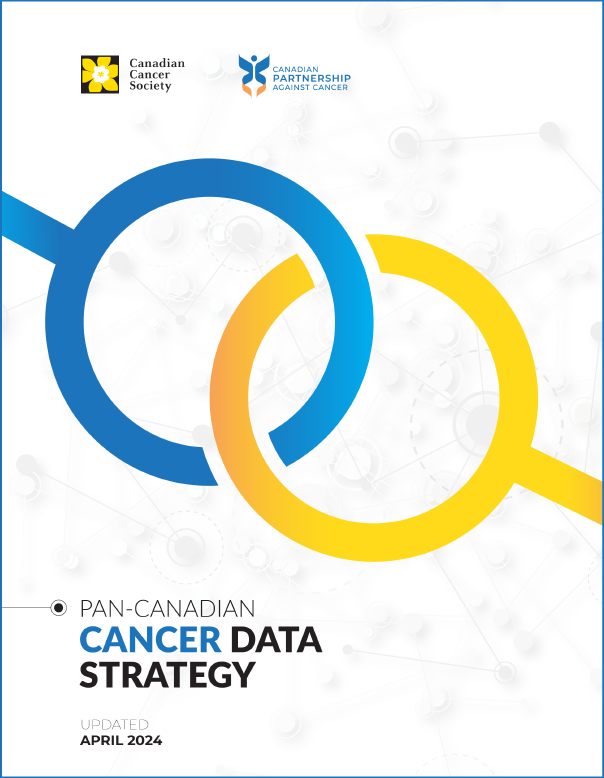2023-24 Annual report
A vision to transform cancer care through data
In July 2023, CPAC and the Canadian Cancer Society released the pan-Canadian Cancer Data Strategy, marking a pivotal step towards enhancing the collection, integration and use of cancer data, and ensuring high-quality, up-to-date information is available. This year also saw Canada’s first-ever cancer equity-measurement forum and the successful staging of a major biennial cancer research conference.
A system-wide improvement

The pan-Canadian Cancer Data Strategy (cancer data strategy) is Canada’s first strategy that focuses on cancer specific-data and complements both the Pan-Canadian Health Data Strategy and the Pan-Canadian Interoperability Roadmap. It is the result of extensive collaboration that has brought together diverse experts and voices to tackle the challenges of managing and using cancer data in the most effective ways.
Why the cancer data strategy is a key for success
The cancer data strategy will unlock critical advancements in cancer care while respecting privacy, First Nations, Inuit and Métis data sovereignty and principles of data governance. The cancer data strategy emphasizes the importance of equity-denied communities gaining control over their collective data, which can be accomplished by upholding data governance principles such as OCAP® (ownership, control, access and possession) within First Nations communities and the EGAP framework (engagement, governance, access and protection) within Black communities.
By modernizing how we collect, analyze and share high-quality cancer data, the strategy empowers various stakeholders to make a positive impact:
- Healthcare organizations and researchers gain access to evidence-based information for optimizing treatment approaches and improving patient outcomes. This fosters innovation and supports continuous quality improvement in cancer care delivery.
- Policymakers use data to make informed decisions about cancer prevention, treatment and resource allocation.
- Patients and the public benefit from more effective treatments and, ultimately, experience improved health outcomes.
The cancer data strategy includes a framework to guide the mission, vision, values and success factors for improvement in cancer data over the next five to 10 years. Through CPAC funding, partners in all provinces and territories are actively advancing four out of 13 areas of action of the cancer data strategy. For example:
- British Columbia is modernizing cancer registry operations by implementing cutting-edge natural language processing solutions to automate prostate cancer staging.
- Newfoundland and Labrador and Nova Scotia are collaborating with British Columbia to implement an AI solution to process data from various systems in order to more rapidly identify cancer cases for their provincial cancer registries, which will save hundreds of human resource hours per year.
- Prince Edward Island is leading a project to comprehensively address and analyze race and ethnicity-based health disparities in cancer care.
The cancer data strategy aims to leverage data to enhance all aspects of cancer care, from prevention to survivorship, ultimately improving outcomes for patients with cancer and their families across Canada. In collaboration with our partners, CPAC is successfully advancing each of the cancer data strategy’s three priorities.
The pan-Canadian Cancer Data Strategy is providing an opportunity for provincial and territorial cancer programs to collaborate with each other, rethink how we interact with data and leverage our rich data holdings to effect change along the full continuum of cancer control. The cancer data strategy will inform and guide initiatives that will positively impact Canadians and reduce the burden of cancer in Canada, and the strategy will also position jurisdictions in Canada to participate in international cancer benchmarking initiatives.
CPAC has also curated examples of current initiatives being implemented that align with the cancer data strategy’s priorities and facilitators, and show how advancing the priorities will make it easier to capture, analyze and use data.
Equitable access to care leads to better cancer outcomes
CPAC convened the first-ever Cancer Equity Measurement Forum in October 2023. Nearly 100 participants from across Canada came together to drive collective action, foster collaboration and advance policy to address disparities in cancer care and outcomes.
Cancer equity is about ensuring that all individuals, regardless of their socioeconomic status, gender, race, ethnicity, sexual orientation or geographic location, have equitable access to cancer prevention, screening, diagnosis, treatment, survivorship and palliative and end-of-life care.
The forum empowered communities and individuals affected by cancer to participate in dialogues and decision-making related to cancer equity. By amplifying the voices of equity-denied populations, the forum centred their unique perspectives, needs and priorities in efforts aimed at achieving health equity.
The forum included First Nations, Inuit and Métis partners, Elders and patient and family advisors, who identified key areas of action to advance First Nations, Inuit and Métis data and data governance. Collectively, participants identified top priorities for advancing health equity measurement and reporting in the cancer system. The forum provided participants with an extensive list of tools and resources to support equity measurement and reporting.
By sharing knowledge, building stronger partnerships and engaging communities, the cancer equity measurement forum was a strong step toward improving the lives of all people in Canada affected by cancer.
Championing a collaborative cancer research community
The sixth biennial Canadian Cancer Research Conference (CCRC) convened 872 cancer researchers to share diverse perspectives, expertise and resources, all with the goal to accelerate progress in cancer prevention, treatment and care. The conference showcased the latest advancements in research across the research spectrum, including biomedical, clinical, health services research and social, cultural and population health research highlighting emerging trends in cancer research.
Hosted by the Canadian Cancer Research Alliance (CCRA), the 2023 CCRC took place in Halifax, Nova Scotia, and featured four plenary sessions, 22 concurrent sessions, four workshops, 124 lightning presentations and over 470 poster presentations.
First Nations, Inuit and Métis-led sessions
As a leading supporter of the conference, CPAC worked with CCRC’s First Nations, Inuit and Métis planning group to create a dedicated stream within the conference. Four sessions hosted with First Nations, Inuit and Métis partners and researchers presented unique work on the themes of cultural safety, the cancer journey, data and information and First Nations, Inuit and Métis cancer strategies.

By actively involving First Nations, Inuit and Métis partners and highlighting Indigenous-led research, partners demonstrated a collective commitment to improving health outcomes and promoting Indigenous voices in the cancer research landscape. The conference integrated a reconciliation lens by including a cultural opening and closing, space for ceremony, a wellness room, engagement with traditional healers and engagement in planning and implementing events with First Nations, Inuit and Métis partners. This inclusive approach not only enriches the diversity of perspectives, but also contributes to more effective and culturally sensitive cancer research efforts.
Tapping into the patient perspective
CCRA’s Patient Involvement in Cancer Research Program (PIP) played a significant role in the conference, with the patient voice informing the development of the scientific program. In addition, all conference sessions were co-chaired by patient partners. Through its support of PIP, CPAC helps provide a platform for patient and family advisors to contribute their insights and perspectives. This ensures that the patient voice remains central to cancer research and decision-making processes.
